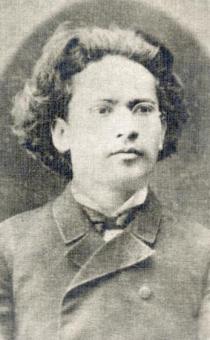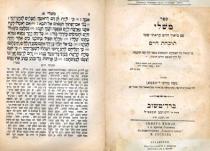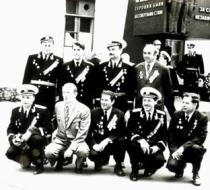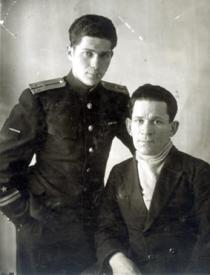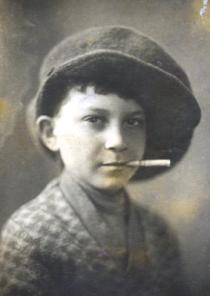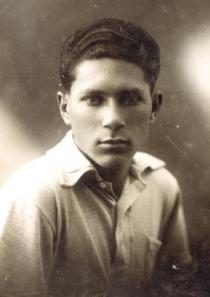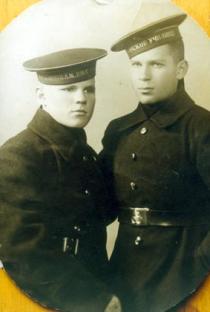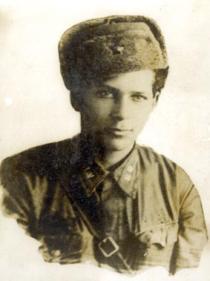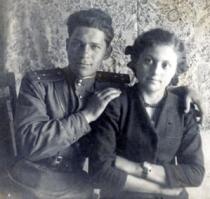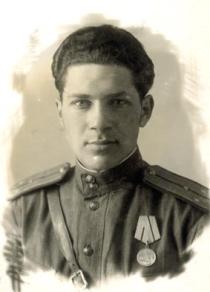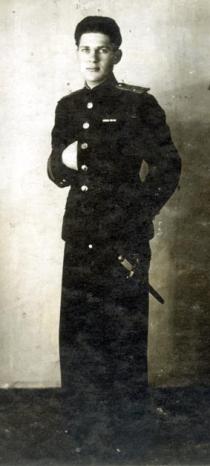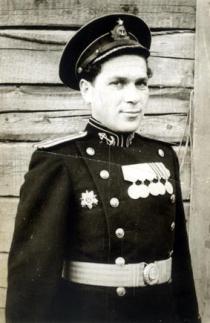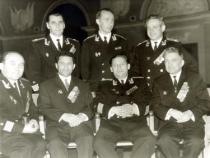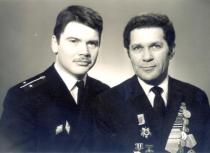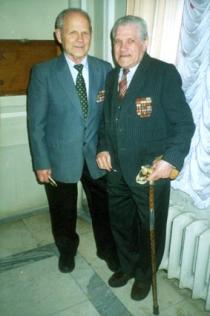This phohograph of was made in autumn of 1942 on the Stalingrad front. At that time I was a lieutenant. Pay attention to special military insignia on the collar of my soldier's blouse: it was an attribute of Soviet uniform until 1943, after 1943 they introduce into practice shoulder straps (in connection with the victory in Stalingrad fight). It was taken in November 1942 on Stalingrad front and I do not remember who did it.
By that time German troops approached Volga (Stalingrad, Volgograd at present). Our School students immediately finished their practical studies and moved to Baku. But we, specialists in topography ('educated' already after a year of studies) were made lieutenants:
those who had not very good marks for exams became junior lieutenants, and those who had good and excellent marks (like me, for example) became lieutenants. And we were sent to Stalingrad hell. It was the time of the famous Stalingrad battle. By the way, not all students, specialists in hydrography were sent to the front line (only 28 from 100). And the rest 72 did not participate.
Most of all I was afraid of being captured: I was Jewish, a Communist Party member, an officer. I joined the Communist Party at the front; I went into actions crying 'For our native land! For Stalin!' We had no idea that Stalin was a devil incarnate. And we knew nothing about ideology of Fascism.
November 19 became the Day of Artillery and Rocket Troops, because it was the day of full-scale offensive in Stalingrad. I was a lieutenant, an assistant of company commander, but by the end of the day I already became a company commander.
Statistics tells us that during that battle, a terrible, a dreadful battle platoon leader commanders lived 3 days. On the fourth day they were either killed or wounded; company commanders lived 7 days.
I became a company commander and managed to drag out my life from November 19 till December 2. The temperature was 30 degrees below zero, and we wore thin socks and naval boxcalf boots. We were in field caps! 30 degrees below zero!
I went to commissary and asked to give me a pistol. They gave me a rifle, an old Russian rifle, rusty. Sergeant fired it several times to clean it and gave it to me. 'I am a lieutenant.' - 'Procure a gun in action! We have no pistols!' To tell the truth, by evening 18 people remained from 100, and only 1 officer - me. So, I was a company commander, I was a platoon leader commander, and I was a section leader at the same time. There was no place to take cover: it was impossible to dig trenches, because the ground was frozen - that was the way we 'amused ourselves'.
There I got my feet and hands frostbitten and also was wounded - therefore in the hospital they treated me both for my wound and for chilblain. A German sniper managed to take aim at us: we had to lie down on the ground covered with snow; we could not move our hands or legs (he would have shot us). And we were underclad… We had to lie still till dark.
We were two: I and a political officer lieutenant Diveykin. Our hands and feet got absolutely frostbitten: we were in boxcalf boots and in rag gloves - not suitable for winter conditions. And only after dark we started rolling over and crawling away. At that time the sniper wounded me in the buttock by an explosive bullet. And the same bullet caused a fatal wound in the stomach of Diveykin.
When we reached our positions, we were brought to a hospital. In the hospital a doctor looked at me (I was 19 years old - a child) and said to a soldier 'Bring him (me) to the operating-room, and take that guy over there.' - 'Where?!' - 'Over there, I said: he is dead.' On our way to the hospital he spoke to me, he called me 'lieutenant'! So, I was quickly operated, and Diveykin…

